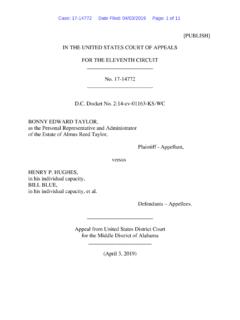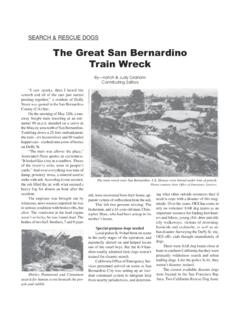Transcription of Writing OMG: Social Media May Wreck Your Kid's
1 OMG: Social Media May Wreck your Kid'sWritingAre Social Networking Sites Harmful?, 2015 Ruth Campbell covers K-12 and higher education for the Southeast , even very young students, such as those in kindergarten and first grade, arefamiliar with technology and the use of keyboards. Students are more and more likely to dothe bulk of their Writing on socialmedia or via texting. They become used to leaving outpunctuation and using abbreviations. Because of this, they can have trouble switching to moreformal English in order to write papers or reports or other assignments.
2 However, familiaritywith technology can also be an advantage, since many jobs now require computer and socialnetworking laptop computers are being loaded with software Friday for Central High School studentsto begin using in January [2014]. Teachers say the usage of computers and socialmedia onsmartphones has caused students' Writing skills to prevalence of Facebook, Twitter and texting has all but obliterated punctuation, capitalization andapostrophes in schools, threatening the future of formal Writing , educators in TechnologyAnd it's no wonder.
3 Cape Girardeau public school students, for example, start learning keyboarding inkindergarten to get them used to technology, curriculum coordinator Theresa Hinkebein said. But shenoted kindergartners already know how to operate smartphones and have computers at itself doesn't have an effect on grammar and formal Writing , but with people relying moreon electronic devices, physical handwriting also is said students are taught cursive Writing the second semester of second grade, andkindergarten through 12th-grade students are taught when it's inappropriate to use informal language.
4 "Our teachers really try to help our students understand the difference between formal and informalwriting," she students come to school "already immersed in technology," Hinkebein are more likely to commit certain grammatical errors because they use theconventions of texting, tweeting and Facebooking in their formal academic superintendent for academic services Sherry Copeland said though spell-check andgrammar software exist, students still need to know how to spell and use correct grammar. Copelandsaid she has been on job interviews where a prospective employer has asked her to sit down andwrite something Missouri State University Writing instructor Eric Sentell said in an email to the SoutheastMissourian that since he began teaching six years ago, he's noticed a difference in the quality ofstudents' Writing .
5 "Students are more likely to commit certain grammatical errors because they use the conventions oftexting, tweeting and Facebooking in their formal academic essays. Occasionally, I see actual 'textlanguage,' like using the letter 'u' instead of the word 'you,'" Sentell of the time, it's lack of capitalization, punctuation and apostrophes, Sentell Switching"Everyone speaks and writes differently for different audiences, but some students struggle to switchbetween the informal codes of texting and socialmedia and the more-formal codes of standard writtenEnglish and academic or professional Writing .
6 After noticing increases in text language and othergrammatical errors, I began emphasizing 'code-switching,' or adapting one's Writing to one's audience," Sentell wrote."I observed a significant reduction in those errors and an increase in the overall quality of my students' Writing . But some capitalization, punctuation and apostrophe errors still creep in every now and then."Central High School principal Mike Cowan, a former English teacher, said texting language hasbecome so commonplace, he even noticed a billboard between Cape Girardeau and Oak Ridge thatused "U" instead of "You.
7 ""If we have a disciplinary situation in school, we always invite the student to write a statement aboutwhat happened to try and get down to the facts of the situation. They'll write in that kind of informalexpression. I see it more all the time. I think it is indeed an academic battle that faculty teachers arefighting .." Cowan a while, Cowan said he fought texting, but he's doing it himself now."Often I'll get comments that I've been texting in complete sentences. Now I'm going for declarativesentences.
8 I guess I've even relented to some degree," he bottom line, though, is over time people lose Writing skills."I guess you could argue it's not a loss, but it's a displacement, a change. I'm not so sure how far youcan change and still continue to communicate accurately," Cowan Atwood, coordinator of the Cape public school's Adult Education and Literacy Program, said herstudents are excellent at texting, because that's their primary written students those in their mid- to late 40s are "totally lost" on that score, she two largest age groups served by the Adult Education and Literacy program are 19 to 24 andmid-20s to 40s.
9 Atwood said it doesn't serve "all that many" in the 17- to 18-year-old SkillsAtwood said economic and education background affect electronic literacy, as well. "If you were middle class or above, you're probably technosavvy," she said. "People in some of the lower incomebrackets, not so much," because they haven't had access to technology."It has affected students' ability to write and write coherently. They have to relearn what they mighthave already known, or learn new skills that they never mastered, because again, they're used towriting informally and now we're asking them to write with a much more formal.
10 Purpose, defendingtheir reasoning, and that's not what they're doing when they're communicating, oftentimes, betweenfriends," Atwood students, meanwhile, struggle with the basic computer skills that are needed even at lower-paying , a lot of the assessment tests students take in high school or adult education programs arecomputer-based."They have to have the ability to keyboard and communicate their thoughts in that manner," Atwoodsaid. "The use of pencil and paper is going away."Over the next year, Atwood said, her program will launch a transitions course in which adult educationand literacy staff will work with students on the next steps to take after earning a high schoolequivalency diploma.






